Costa Mesa councilwoman walks the walk during ‘Week Without Driving’ challenge
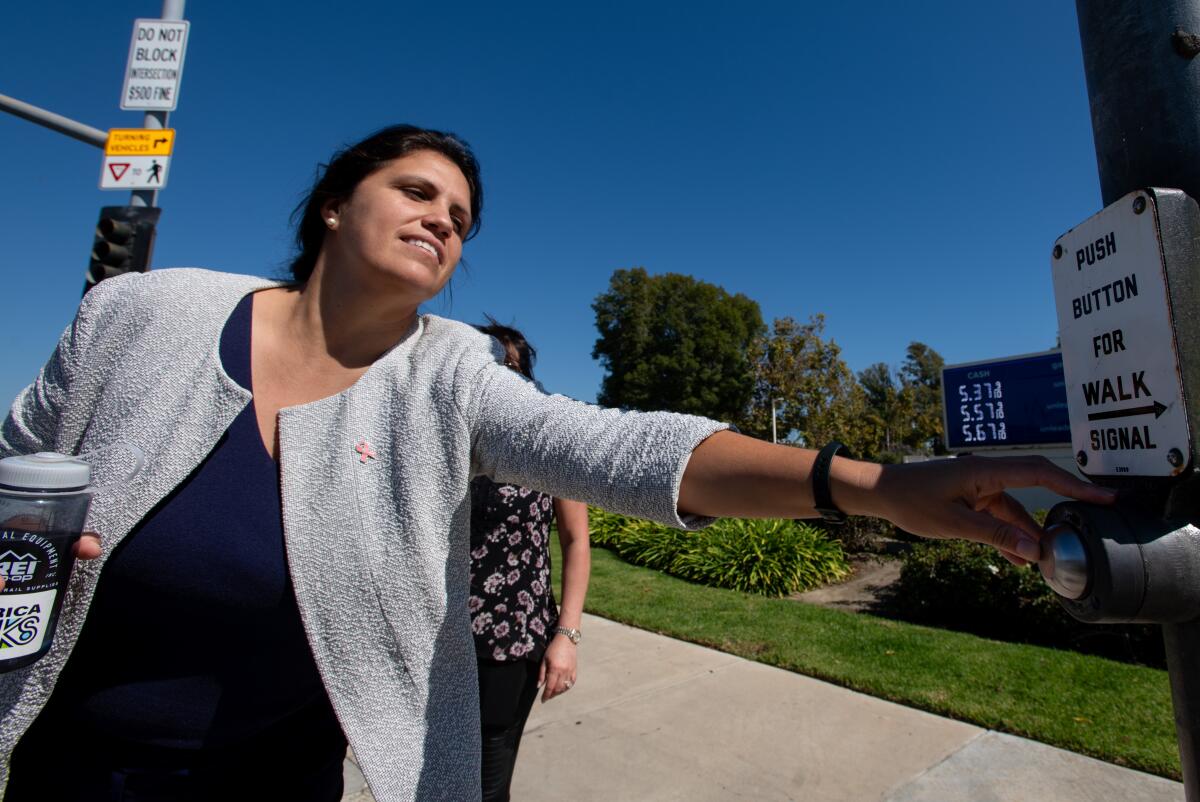
- Share via
Costa Mesa Councilwoman Arlis Reynolds is a big proponent of making the city more walkable and bikeable through better infrastructure planning, but until recently she hadn’t truly walked the walk.
An avid bicyclist, she was already familiar with the city’s bike lanes and having to contend with cars for travel space and right of way. But when it came to walking or taking public transit across town, Reynolds admits she was a little rusty.
“I haven’t been on a bus in, like, 30 years,” she said.
That all changed earlier this month, when Reynolds decided to go a full week without driving and instead rely on walking or riding the bus to and from City Hall, appointments, meetings and shopping trips.
“You see the city differently and notice things you wouldn’t have if you were just driving around,” she said on Oct. 5, the fourth day of her experiment.
Reynolds’ commitment was inspired by her service on the national nonprofit board of America Walks, which advocates for safer, more walkable communities.
The group’s “Week Without Driving” challenge asks elected officials and local decision makers to walk a proverbial mile in the well-worn shoes of the estimated 25% of the American public that relies solely on modes of transportation other than automobiles.
This year, the effort became a national campaign to get civic leaders across the nation out into the streets of their respective jurisdictions to gain first-hand experience of the mobility issues pedestrians and bicyclists face when interacting with the local infrastructure.
Transit routes, bus stops, bike lanes and bulb-outs, sidewalks and crosswalks are all fair game for the seven-day scrutiny, which has the potential to give birth to new policies and practices.
To complete the challenge, Reynolds, already an avid bicyclist, walked, rode buses or, when absolutely necessary, hitched an occasional ride from a loved one.
Reynolds quickly discovered traversing the streets of Costa Mesa provided a pretty clear picture of what works and where improvements are still needed.
“Even though I feel like I knew it already, I hadn’t really experienced how hostile the infrastructure was,” she said, describing the perils pedestrians face, particularly when pitted against drivers.
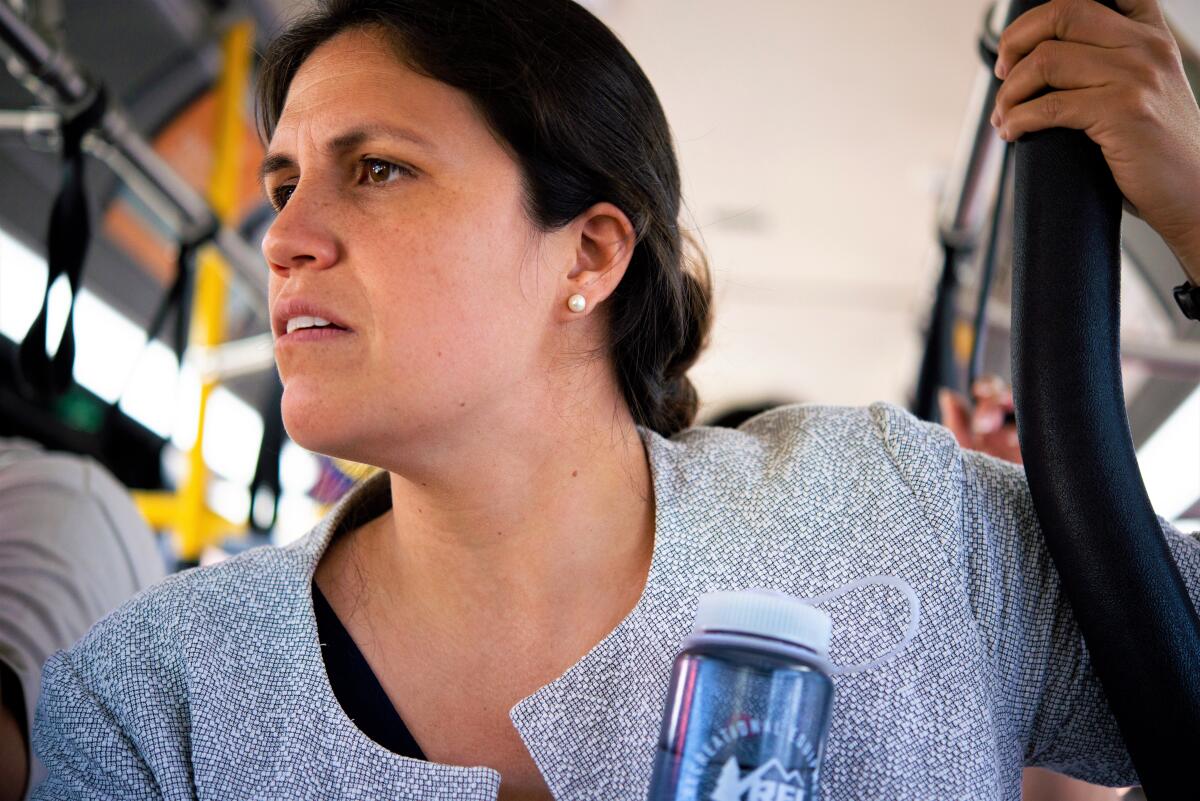
“I’ve seen teenagers, older people, someone carrying food — these are people whose lives are made more dangerous or more convenient by the choices that we’re making.”
Costa Mesa has recently made great strides toward accommodating active transportation, or non-motorized travel, investing millions into street improvement projects that fostered more of a “share the road” mentality. In 2021, citizens were invited to participate in walk audits designed to root out vulnerabilities faced by pedestrians.
An Active Transportation Committee was formed in 2015 to recommend updates to the city’s general plan and to inform the creation of a pedestrian master plan to guide future policy decisions related to walkability and bikeability.
Last year, officials hired an active transportation coordinator, Brett Atencio Thomas, to help oversee the implementation of several new projects and initiatives.
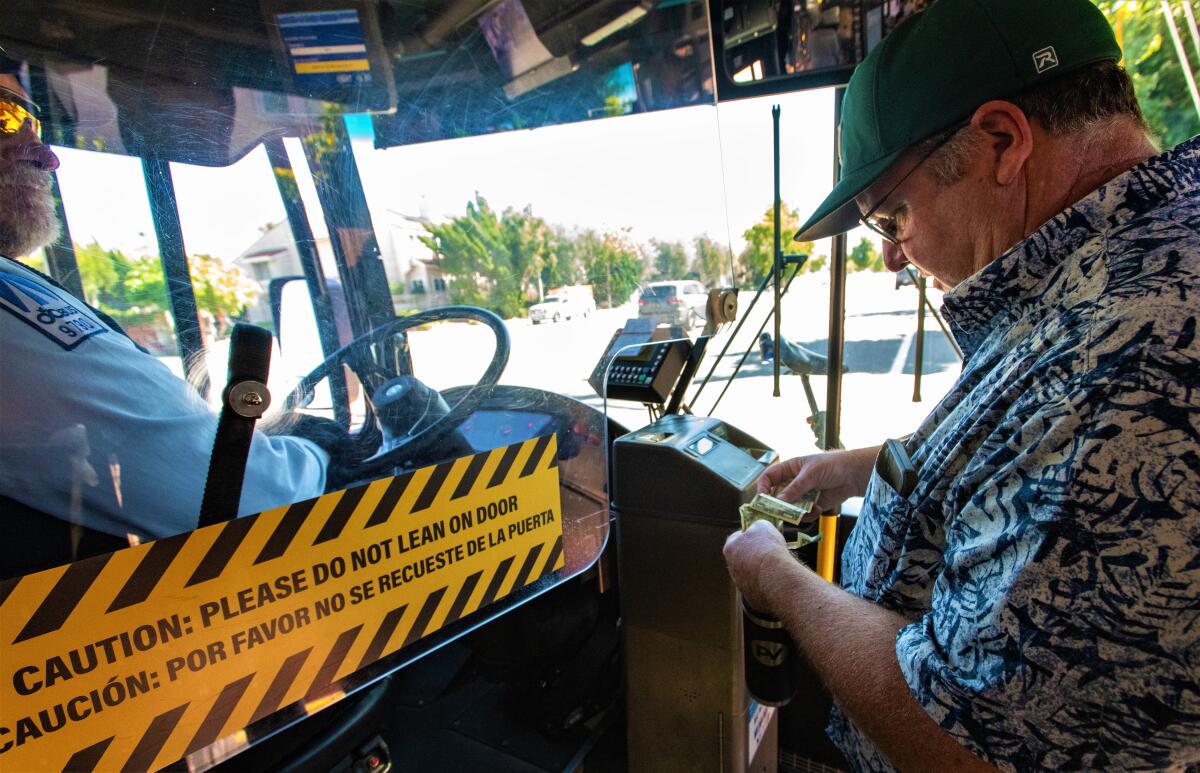
Thomas previously worked at Los Angeles County’s Metropolitan Transportation Authority, where he managed a $13-million Open Streets grant program that funds the county’s popular CicLAvia open streets bike festival. He also helped open more than 200 Metro Bike Share stations and developed Metro’s Adopt-a-Bike Program.
But aside from his professional background, what made Thomas an ideal candidate was the experience and insight he’s gained from several years of living and traveling in Southern California without a car.
An Orange Coast College graduate on his way to studying urban planning at San Francisco State University in 2010, Thomas divested himself of his Nissan Titan pickup truck.
“I was already into walking and biking and doing all that urban stuff,” he recalled Tuesday. “So I sold it — I took a loss on selling the car but I was really determined this was a good decision.”
These days, Thomas gets around Costa Mesa mainly by bike. Like Reynolds, the experience of having to rely on the city’s active transportation network gives him valuable information on how it’s working for an estimated 7,000 daily transit riders and countless pedestrians.
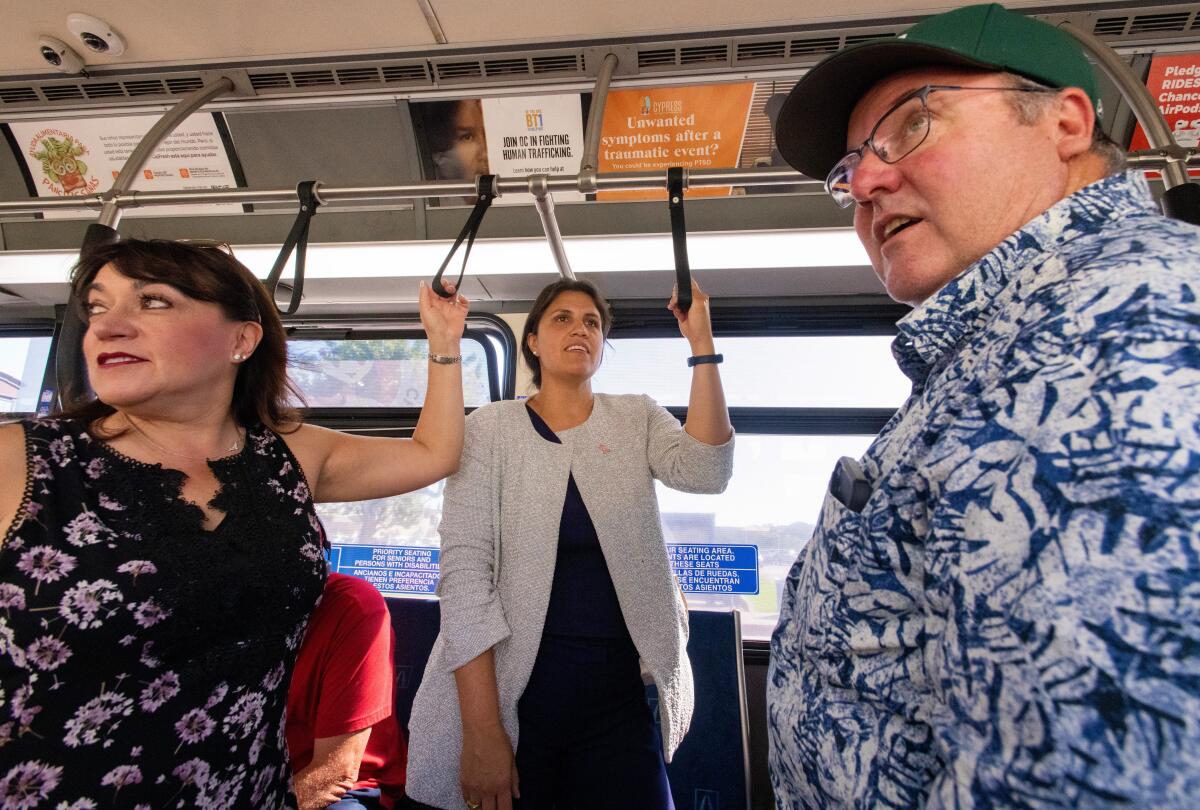
“Being car-free I’m actually able to help design infrastructure in a way that is cognizant of the needs of those individuals I’m designing [it] for,” he said. “It’s one thing to design infrastructure based on best practice in a book, but it’s another thing when you actually have that lived experience.”
On the fifth day of Reynolds’ week without driving, the councilwoman was joined by Mayor John Stephens, Thomas and transportation services manager Jennifer Rosales.
The group met at City Hall and took a bus to the busy intersection of Harbor Boulevard and 19th Street, walking from there to Original Barista for coffee. From there, they walked to nearby Globe Deli, where they spoke with employees and patrons about various issues.
Stephens, who’s lived in Costa Mesa for 30 years but cannot recall ever taking the bus, said he was stunned to learn how many denizens rely on the local transit system.
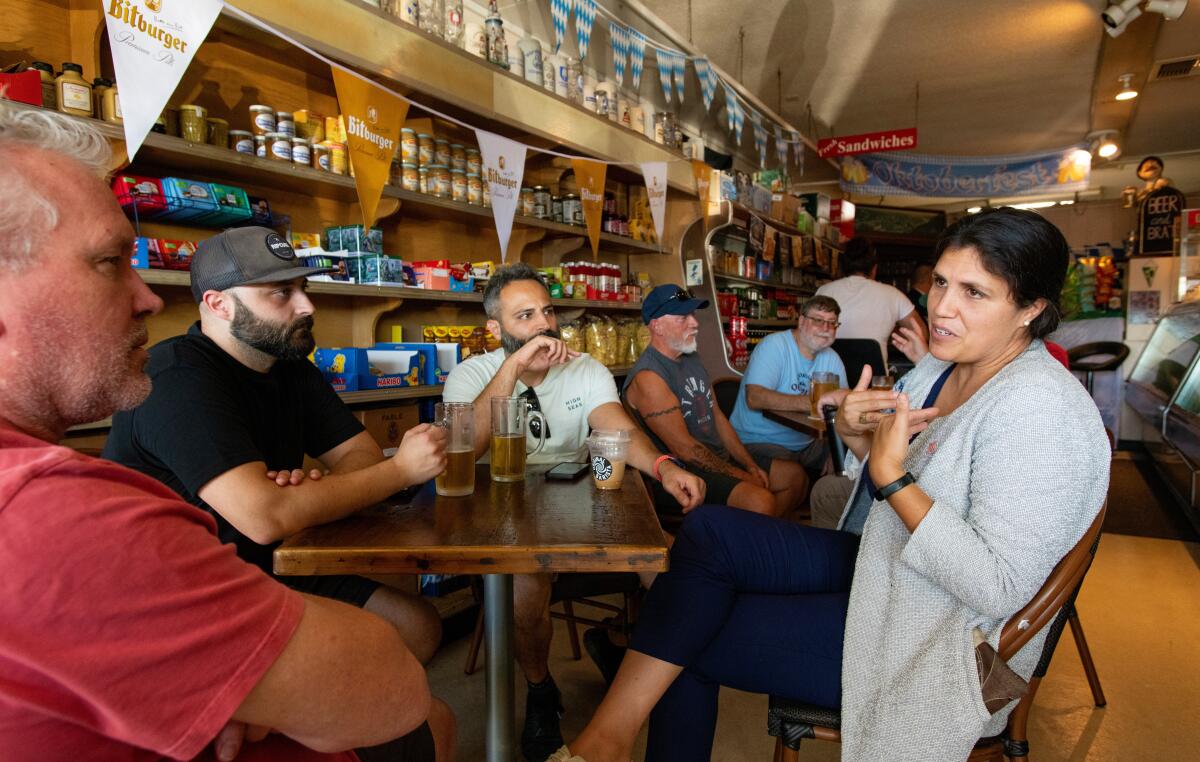
“I was surprised that [buses] were pretty well packed with people,” he said Tuesday. “We don’t usually walk through the neighborhood like this when we don’t have campaign literature in our hands — whenever you do something like this you become more aware.”
Reynolds, who officially concluded her week without driving last Sunday, is already thinking of improvements for transit riders, first by evaluating all the city’s bus stops to ensure they meet the same standards and adding vital shade and seating where they are currently lacking. And that’s just the beginning.
“I’m interested in looking at broader routes. What I haven’t done is zoom out and see the whole network,” she said in a debriefing Tuesday. “I think there’s an assumption transit can never work in Orange County, but, actually, it could.
“I’m two days past the campaign, and I’m walking still.”
Updates
5:43 p.m. Oct. 17, 2023: This story was updated to reflect active transportation coordinator Brett Atencio Thomas’ attendance at the Oct. 6 trip.
All the latest on Orange County from Orange County.
Get our free TimesOC newsletter.
You may occasionally receive promotional content from the Daily Pilot.






